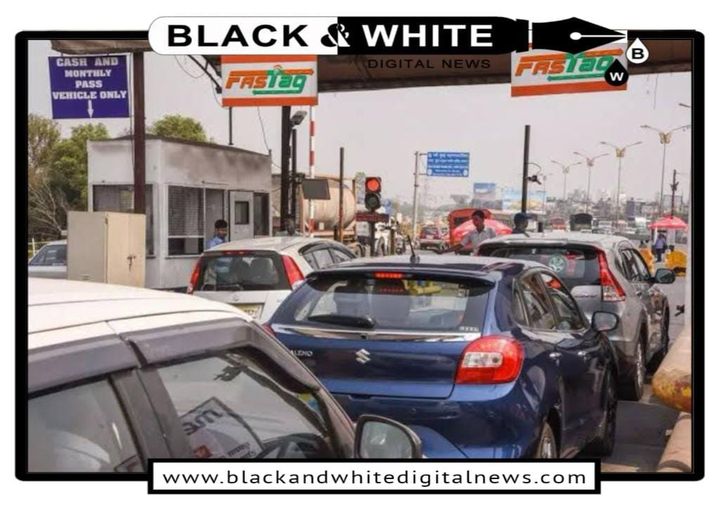||Black and White Digital News ||
||Parvinder Singh July 21,2024 ||
In a significant move to streamline toll operations and reduce congestion, the National Highways Authority of India (NHAI) announced stringent penalties for vehicles without FASTags on their front windshields. The Ministry of Road Transport and Highways (MoRTH) has decreed that such defaulters will be charged double the usual toll fee, aiming to deter intentional non-compliance and ease traffic flow at toll plazas.
Addressing Delays and Inconvenience:
The MoRTH explained that vehicles without FASTags cause unnecessary delays at toll plazas, leading to congestion and inconvenience for other highway users. The new directive aims to promote the use of FASTags, which facilitate smooth and swift toll transactions, thereby reducing wait times and enhancing the overall travel experience on national highways.
Standard Operating Procedures and Enforcement:
To ensure consistent enforcement, the ministry has issued detailed Standard Operating Procedures (SOPs) to all User Fee Collection Agencies and Concessionaires. These SOPs mandate the collection of double toll fees from vehicles without FASTags, and the information regarding this penalty will be prominently displayed at all toll plazas.
Issues with Private Contractors and Toll Plaza Management:
Despite these measures, several toll plazas, managed by private contractors, face challenges in adhering to these SOPs. Instances of mismanagement, leading to scuffles and traffic jams, have been reported. The hired manpower at these toll plazas often struggles with enforcing rules effectively, resulting in chaotic situations during peak hours.
Private contractors, responsible for the toll collection at many plazas, often operate with significant autonomy. This autonomy sometimes leads to lapses in standard protocol, contributing to inefficiencies and conflicts at the toll booths. Reports of overcharging, lack of adequate signage, and poor management practices have been frequent .
Need for Surprise Checks and Improved Oversight:
To address these issues, it is crucial for NHAI to conduct surprise checks at toll plazas. Regular inspections would ensure that the SOPs are being followed, and traffic control systems are in place to prevent congestion and overcharging. Enhanced oversight by NHAI teams would also mitigate mismanagement and improve the efficiency of toll collection operations.
Surprise checks by NHAI could play a pivotal role in identifying and rectifying these issues. These checks would ensure that the toll collection processes are transparent and fair, thus restoring trust among highway users. Additionally, training programs for the personnel managing the toll booths could be instituted to ensure better handling of operations and interactions with motorists.
Potential Benefits and Long-term Impacts:
Implementing these measures is expected to yield several benefits:
Reduced Congestion: Ensuring more vehicles use FASTags will streamline toll payments, reducing wait times and easing traffic flow at toll plazas.
Improved Compliance:The threat of double toll charges is likely to compel more motorists to affix FASTags, increasing overall compliance with regulations.
Enhanced Revenue:With fewer instances of toll evasion and more efficient collection processes, revenue from tolls is expected to increase.
Better User Experience:Reduced delays and smoother operations at toll plazas will enhance the overall experience for highway users, potentially increasing the use of national highways.
The imposition of double toll fees for non-FASTag vehicles marks a significant step towards improving toll plaza operations and reducing traffic snarls on national highways. However, for this initiative to be truly effective, NHAI must also focus on the proper management of toll plazas, ensuring adherence to regulations through regular oversight and surprise checks. This comprehensive approach will ensure a smoother, more efficient toll collection system, benefiting all highway users.
By addressing these operational challenges and ensuring strict enforcement of the new rules, the NHAI can create a more efficient and user-friendly tolling system. This, in turn, will contribute to a more seamless travel experience on India’s highways, supporting the broader goals of modernization and infrastructure development.
Leave a comment
You Might Also Like
SSP Leh Along with District Officials Visit De-Addiction Centre Leh, Encourage Patients Towards Recovery and Rehabilitation
SSP Leh Along with District Officials Visit De-Addiction Centre Leh, Encourage Patients Towards Recovery and Rehabilitation Leh, Feb 9: Today,…
1 Min Read
Katra Roop Way Bun Kar Rehega MLA Katra Baldev Raj Sharma Ka Bayan Me Jeeta He Isi Promise Pe Hu
Katra Roop Way Bun Kar Rehega MLA Katra Baldev Raj Sharma Ka Bayan Me Jeeta He Isi Promise Pe Hu…
0 Min Read
PDP Na BJP K Sath Alliance Na Kiya Hota Aaj Article 370 Bhi Hota Aur J&K Ki Halat Bhi Behtar Hoti Nc Senior Leader Mubarak Gul
PDP Na BJP K Sath Alliance Na Kiya Hota Aaj Article 370 Bhi Hota Aur J&K Ki Halat Bhi Behtar…
0 Min Read
Implementation of Rural Development Schemes Concludes at Leh
Implementation of Rural Development Schemes Concludes at Leh Leh, February 07, 2026: The three-day State-Level Training Programme on Effective Implementation…
2 Min Read









